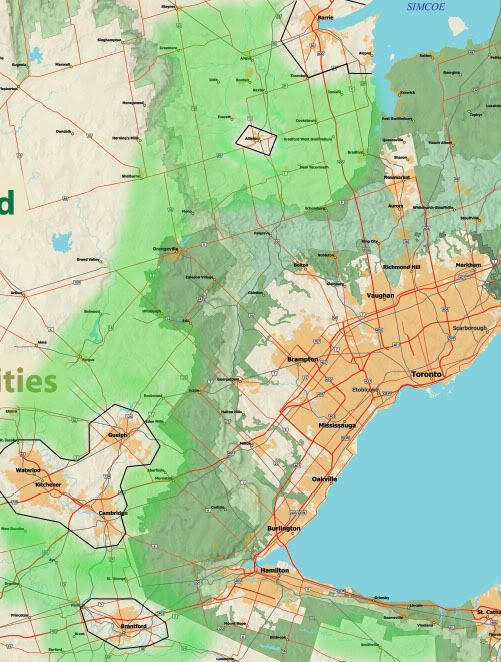I wrote:
The basic exclusion of south Simcoe and Dufferin Counties and Southeast Wellington County was a mistake. Guelph, Eramosa, Puslinch, Erin Townships in Wellington should have been included, as should have most of West Gwillimbury, Essa, New Tecumseh and Adjala-Tosorontio in Simcoe, and Mono and East Garafraxa Townships in Dufferin.
And look what the feature story in the Star today is:
Sprawl hits above the belt
The province created a well-intentioned greenbelt to help curb urban sprawl north of Toronto. But on the belt's upper fringes, local councils are bucking recommendations meant to prevent leapfrogging development, Peter Gorrie writes
Mar 10, 2007 04:30 AM
BOND HEAD – At first glance, this is just a quiet crossroads about 45 minutes northwest of Toronto.
There's a scattering of aging brick houses, a tiny church, a gas station and restaurant, and a couple of variety stores where Highways 27 and 88 intersect amid open fields and forlorn patches of trees. The last big change happened about 40 years ago, when a small subdivision went in just west of the old village core. With it, the population grew to around 500, and there it sits.
But not for long. This sleepy hamlet is at the heart of a development boom, and the new official greenbelt that curves across the Greater Toronto Area appears unlikely to stop it, despite the provincial government's best intentions.
The 720,000-hectare band of farmland and natural spaces is supposed to curb urban sprawl north of Toronto and make development beyond it impractically distant for potential commuters. The problem is, it takes less than 10 minutes to cross the greenbelt on Highway 400.
Just beyond that protected strip is Bond Head and the rest of Simcoe County, a rolling, mostly rural area bisected by the expressway. It starts just north of the Holland Marsh's rich, black soil and runs past Barrie and Orillia up to Severn Bridge, where the Canadian Shield begins. To the east, it stretches to Lake Simcoe; to the west, Collingwood.
While the province didn't include Simcoe County in the greenbelt, it has tried, using a maze of policies and regulations, to control the county's growth.
But developers have been snapping up land anyway, particularly in the lower half of the county south of Barrie. They're proposing projects that, if approved, would nearly triple the population to 1.2 million, says county planner Ian Bender. They'd also cover large swaths of fertile land with industrial parks, shopping malls and roads.
The county is the "Wild West" of development in Ontario, says Rick Smith, executive director of Toronto-based Environmental Defence.
Most local politicians and business people are eager for economic growth and insist it can be managed without destroying the county's environment and its relatively tranquil lifestyle.
But environmentalists complain the boom is proof the greenbelt isn't working: Instead of containing growth, it's simply leapfrogging a few kilometres north.
It's a long and interesting article. Here's the link for the whole story:
Sprawl hits above the belt




